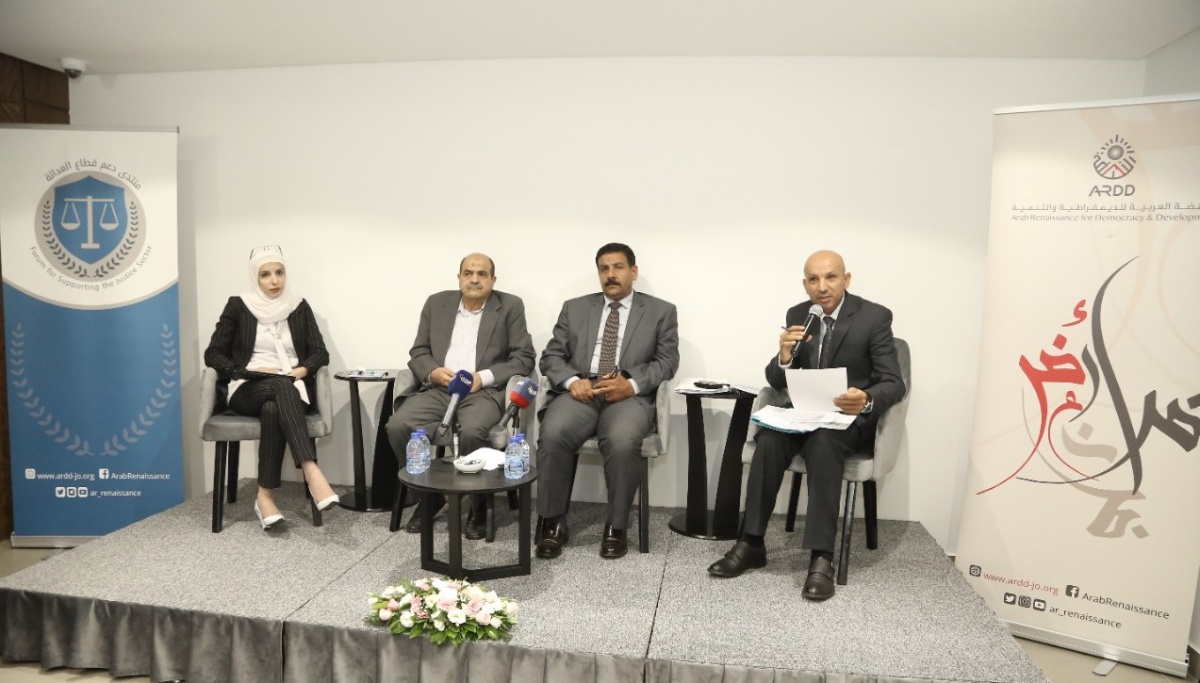A dialogue and extensive debate on the new amendments to Narcotics and Psychotropic Substances Law for the year 2021 took place at the Arab Renaissance for Democracy and Development (ARDD) headquarters on Sunday, with the aim of making clear their legal implications.
The main speakers were the chairman of the House of Representatives Legal Committee, Dr. Muhammad Al-Hilalat, former director of the Anti-Narcotics Department, retired Major General Tayel Al-Majali, an expert in security and justice, Dr. Abdullah Abu Zeid, and Professor of Clinical Sociology at the University of Jordan, Dr. Rola Al-Swalqa.
Also attending were experts, specialists, several lawyers, judges, and representatives of civil society institutions.
The session was held by the Forum for Supporting the Justice Sector; to reaffirm the role the justice system and civil society organizations play in combating certain issues prevailing in the society and to raise awareness about laws and their interpretations, particularly now that public opinion in Jordan is divided following the approval of the House of Representatives of the amended law, which states, among others: “Considering that anyone who used, imported, brought, smuggled, exported, possessed, acquired, bought, received, transported, produced, manufactured, stored or planted any of the narcotic substances for the first time shall not constitute a criminal precedent against first time offenders if the substances were intended for their own consumption.
Some participants said the amended law is bound to encourage the use and drug dealing on an even larger scale; statistics show that drug-related crimes grew 20 fold over the past two decades. In 1999, the total number of reported drug cases stood at 905, according to Public Security statistics. The figure jumped in 2013 to 7,713 cases and reached 19,500 in 2019.
Others believed that not criminalizing first-time use or possession of narcotic substances is a rational decision that gives offenders an opportunity to mend their ways. The broad title of the discussions was: Is the first-time abuser a culprit or a victim?
ARDD Executive Director Samar Muhareb said that the organization’s legal department had dealt with 83 drug-related cases last year, registering a 67% increase in drug-related cases than the year before. Of the cases, 97% were males and 3% were females. Muhareb also said that there are social and economic reasons that led those individuals to use drugs.
Abu Zeid denied that Jordan is an exporter or manufacturer of narcotics, yet stressed that there is a large number of addicts, adding that in 2018, about 26,000 people were arrested for drug abuse. He pointed out that the 2013 amendments to the Narcotics and Psychotropic Substances Law, which “prevented the public right prosecutors to file a lawsuit against those who use drugs for the first time”, resulted in 6,113 more cases of drug abusers than in the previous year.
Al-Hilalat said that the law gives a real opportunity to a first-time user by not recording it and thus creating a criminal precedent for or imposing legal restrictions on the user, but it does not mean that they escape punishment, it only gives users the chance to avoid committing such offense again. According to Al-Hilalat, the law tightens the penalty for anyone who offers narcotics or psychotropic substances to a non-consumer to unwitting victims, since now, the act is a felony and punished as such, instead of being a misdemeanor. He pointed out that the approval of the amended law came after a study done collectively by experts in the fight against drugs, military judges, and specialists.
Al-Majali said that the law in the amended form does not constitute a real deterrent to drug users and proposed issuing a “temporary record” against first-time drug users, lasting for a year, during which they prove that they undergo psychological and physical treatment that would help expunge that record after a year. Al-Majali noted: “The issue of drugs is still in the legislative kitchen, and here, the Senate must have its say to bring about the required change.” He added: “When a drug user enters prison for the first time, he knows only one drug dealer, but upon his release, he will have known more than 20 dealers, not to mention the physical and psychological violations he may be exposed to inside prison.”
Dr. Al-Swalqa said that psychological and social reasons that contribute to the spread of drug abuse, such as growing poverty and unemployment rates, need to be addressed. She said that drug issues, in particular, require practicing, experienced specialists, who study and identify the causes and motives that lead to addiction among individuals, and pointed to the dire reality of the services provided to adult and juvenile drug users, the serious shortage of doctors, nurses and health workers treating addicts and those who suffer from mental disorders.
Justice Sector Support Forum Judge Jihad Al-Daridi also talked about the limited capability of the government, which seeks to address the growing phenomenon of drug abuse without paying the exorbitant costs it entails. Punishment is the only available deterrent available, he said. Educators talked about the importance of spreading awareness among students and parents about drugs and their danger to society through various activities.
The attendees emphasized that the responsibility for drug prevention and rehabilitation should not fall solely on the government’s shoulders; it is, rather, a collective responsibility and all efforts must be exerted by all parties, especially civil society organizations, families, and the private sector, to address it.


